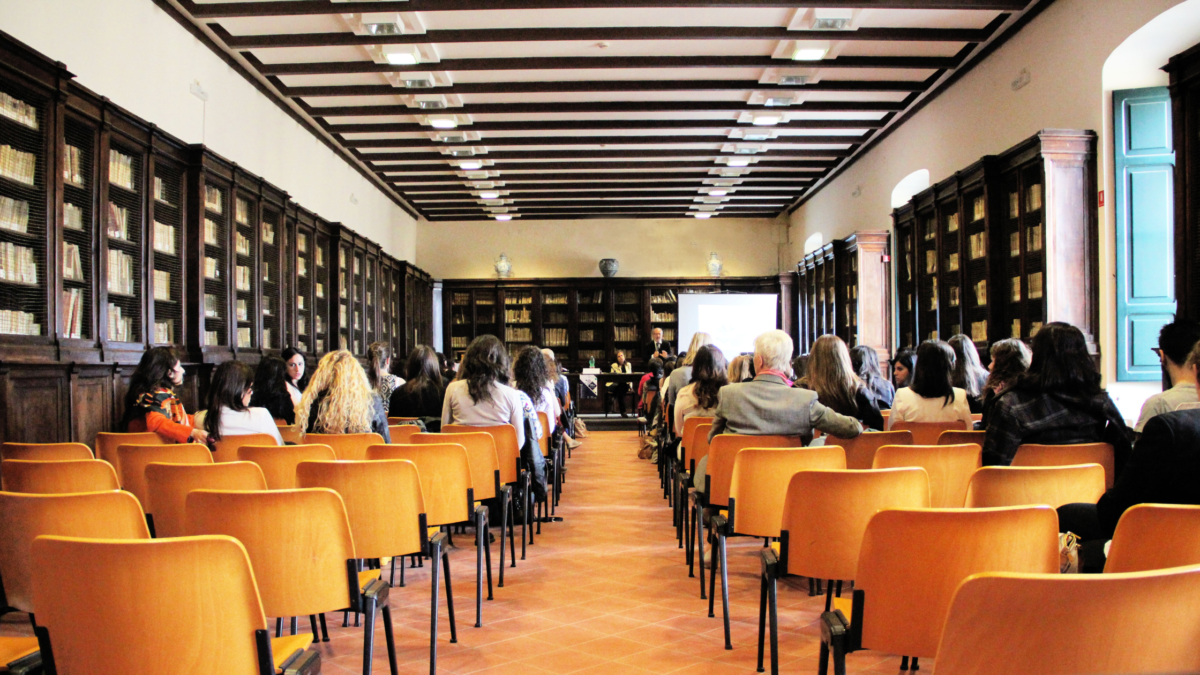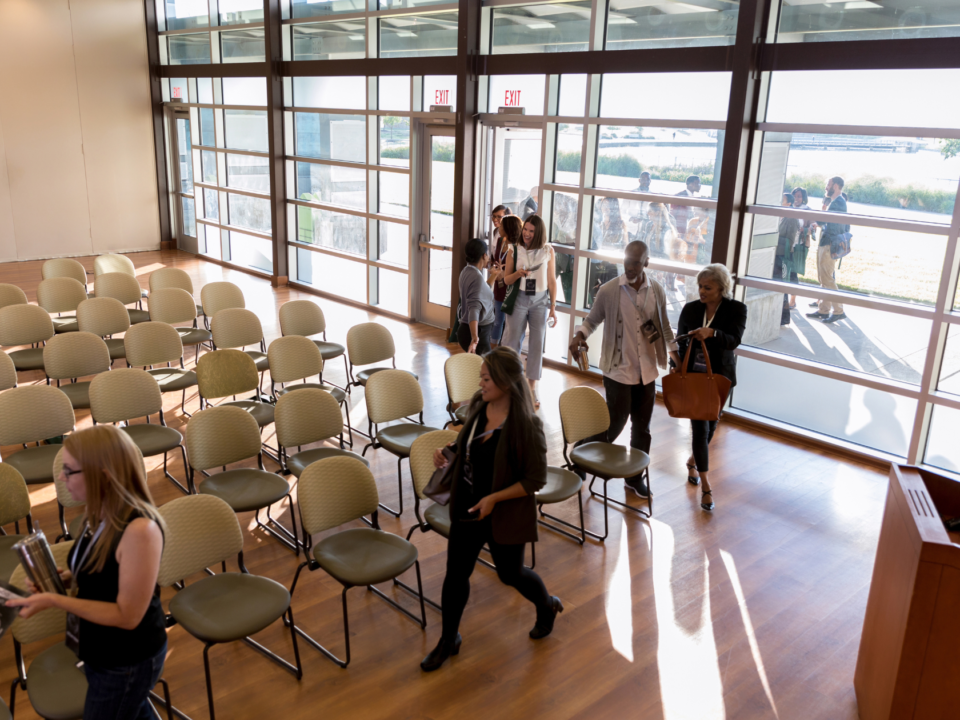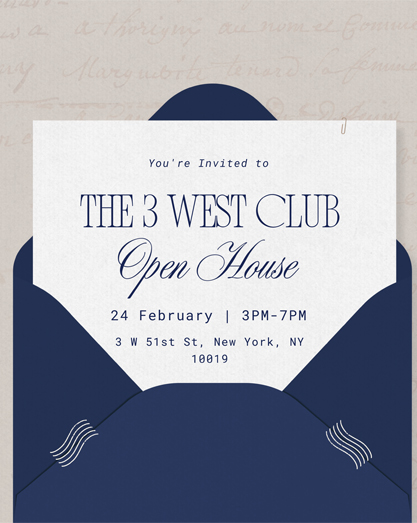Corporate Meeting Venues in NYC Businesses Trust for Successful Events

Top NYC Corporate Conference Venues for Your Next Business Event
August 22, 2025
Large Corporate Event Venues NYC Companies Prefer for Major Gatherings
August 22, 2025In New York City, corporate meetings happen every day, ranging from confidential board sessions to energetic sales kickoffs. With so many moving parts, companies don’t just need a venue; they need a venue they can trust. Choosing the right corporate meeting venues in NYC ensures consistency, responsiveness, and the ability to deliver exactly what was promised, without last-minute surprises.
Trusted venues become an extension of your team. They know how to anticipate needs before you even articulate them. They ensure audiovisual systems are tested, catering is delivered on time, and room resets happen seamlessly. In a city where schedules are tight and expectations are high, trust comes from repeated reliability. When businesses find that, they return again and again because they know the venue won’t let them down.
Success in corporate meetings is measured by specific outcomes. Were attendees satisfied? Did the agenda run on time? Did the event stay on budget? And, most importantly, did the meeting achieve its objectives, whether that’s closing deals, strengthening relationships, or aligning executive decisions? Trusted NYC venues are the ones that consistently support these KPIs, providing a foundation for meetings that move business forward.
Meeting Profiles, Objectives, and Layout Needs
The first step in finding a corporate meeting venue you can truly trust is developing a clear meeting profile. Every gathering serves a different purpose, and that purpose should guide the selection of corporate meeting venues in NYC from the very beginning. A leadership retreat centered around long-term strategy calls for privacy, comfort, and an environment where decision-makers can think without distraction. A client briefing, in contrast, should project professionalism and credibility, with décor and service levels that reflect your company’s values. Meanwhile, a sales kickoff or product launch demands energy and flexibility, rooms that can accommodate multimedia presentations, breakout groups, and interactive elements that keep the audience engaged.
Just as important as defining the meeting purpose is understanding who will be in the room. Attendee profiles shape everything from layout to hospitality. Executives often expect private entryways, discreet service, and high-level technical support that ensures presentations run smoothly. Clients may value a polished, brand-appropriate space that feels welcoming rather than sterile. Training groups might need classroom seating with easy access to power outlets for laptops and devices. VIPs may require lounge spaces or green rooms to retreat between sessions, ensuring comfort and exclusivity. By anticipating these needs, planners can save time by eliminating venues that won’t measure up.
Headcount may seem like a simple factor, but it plays a central role in aligning the meeting with the right space. A small board meeting of 12 participants thrives in a boardroom format that encourages dialogue. A mid-sized training for 50 people might be best supported by U-shape or classroom layouts with nearby breakout rooms. Larger gatherings of 100 or more benefit from theater-style or cabaret seating, which balances engagement with capacity. Beyond numbers, the architecture of the room matters, too. High ceilings create an energized, spacious feel, while obstructive pillars or poor sightlines can hinder attention. Trusted venues account for these details and provide flexible options, ensuring the meeting’s success is not compromised by structural limitations.
Technology, A/V, and Connectivity Reliability
Technology is no longer a luxury in meetings; it is the backbone that holds everything together. Trusted corporate meeting venues in NYC recognize this and invest heavily in A/V systems that are robust, reliable, and ready for professional-level presentations. Built-in displays, LED walls, and projection options provide crisp, modern visuals. Confidence monitors positioned at just the right angle help speakers maintain their rhythm without constantly glancing back at slides. Stage lighting further enhances presentations, ensuring that both in-person and hybrid audiences see speakers clearly.
Audio, however, is just as important, perhaps even more. Poor sound can derail even the most compelling presentation. Smaller rooms often struggle with echoes, while mid-sized spaces risk uneven distribution where some attendees strain to hear while others are overwhelmed. Trusted venues offer microphone solutions that match the scale of the event: tabletop microphones for small boardrooms, lavaliers for dynamic presenters, and handheld or ceiling-mounted options for larger groups. Combined with thoughtful acoustic treatments and echo control, these systems ensure participants hear every word without distraction.
Connectivity completes the picture. Attendees expect enterprise-grade Wi-Fi capable of handling multiple devices without faltering. Presenters and production teams require hardwired connections to guarantee streaming stability and avoid disruptions during live demos or hybrid broadcasts. Charging stations and accessible outlets keep devices powered throughout the day, removing the stress of low batteries during critical moments. Trusted venues even plan for redundancy, backup equipment, alternate internet lines, and contingency protocols, so that the meeting continues smoothly even if unexpected technical issues arise. When A/V and connectivity are flawless, attendees hardly notice; when they fail, it becomes the only thing they remember. That’s why reliability in these areas is one of the strongest markers of a venue you can trust.
Hybrid, Recording, and Privacy Considerations
Hybrid participation has shifted from being an occasional add-on to a standard expectation in corporate meeting venues in NYC. Even when most attendees are in the room, there are often participants joining remotely. Trusted venues are prepared for this reality with camera setups that fit the size and format of the meeting. For intimate gatherings, a two-camera arrangement, one wide-angle for the room and one focused on the speaker, often suffices. For mid-sized or larger sessions, multi-camera packages with live switching and graphics ensure remote attendees receive a polished experience.
Recording also plays a critical role in extending the value of meetings. Whether sessions are repurposed for training, compliance, or internal communications, venues should provide clear recording paths and workflows. Trusted venues map out these processes in advance, from consent language and media release forms to secure file storage and timely delivery. When attendees know exactly how recordings will be used and protected, trust extends from the venue to the host organization itself.
Privacy, meanwhile, is a central factor, especially for executive-level or confidential discussions. Trusted venues offer discreet entrances and controlled corridors so high-profile attendees can move without interruption. Secure Wi-Fi networks protect sensitive information shared during presentations. ADA compliance further reinforces inclusivity, with accessible entrances, restrooms, and seating that ensure no participant is left out. Strong safety standards, from evacuation plans to insurance coverage, provide additional reassurance. Together, these features create an environment where participants can engage openly, confident that their conversations and presence are protected.
Location, Service, and Guest Experience
In a city as vast and bustling as New York, location becomes one of the most defining aspects of corporate meeting venues in NYC. Businesses don’t just want a beautiful room; they need a space that’s accessible to busy executives, clients, and partners who often have only a few hours to spare. Midtown has earned its reputation as the most trusted hub for corporate meetings because of its unrivaled convenience. With Penn Station, Grand Central, and multiple subway lines within walking distance, attendees can arrive quickly, attend the meeting, and move on to their next destination with minimal hassle. Add to that the countless hotels, dining options, and client offices nearby, and it’s clear why Midtown remains the go-to choice.
But Midtown isn’t the only option. For gatherings tied to finance, government, or law, Downtown and the Financial District offer proximity to Wall Street, courthouses, and government offices. These venues keep participants close to the industries that shape their agendas. On the other hand, Uptown and West Side venues appeal to companies seeking quieter surroundings, cultural attractions, or unique settings that break away from Midtown’s constant pace. Choosing the right neighborhood sets the tone for the meeting, ensuring it feels aligned with the priorities of the group.
Service is another area where trust is won or lost. The best venues provide more than space; they offer a service model that supports every detail. A dedicated event manager who knows your agenda inside and out, a day-of show caller to keep timing tight, and an on-site A/V lead to solve technical issues before they escalate are all signs of a reliable venue. Behind the scenes, reset crews, coat check attendants, and concierge-style staff ensure attendees experience seamless transitions. Trusted venues also establish clear escalation paths, giving planners confidence that if something changes mid-meeting, a decision-maker is ready to act.
Finally, the guest experience ties everything together. From smooth registration flow to comfortable lounge areas, participants should feel cared for at every step. Thoughtful touches like quiet rooms, prayer or nursing spaces, and wellness corners demonstrate respect for diverse needs. Natural light can energize participants, while blackout shades protect focus during presentations. Balanced temperature control, clear signage, and accessible restrooms prevent distractions and frustration. Ultimately, trusted venues make attendees feel not just accommodated, but valued, a reflection that extends positively onto the host company itself.
Food, Beverage, and Sustainability Practices
Food and beverage planning is about more than keeping people fed; it’s about shaping energy levels and supporting the meeting’s flow. Trusted venues curate menus that prioritize productivity, offering light, energizing, and allergen-conscious options that keep participants alert. Heavy meals, while appealing on paper, often result in mid-afternoon sluggishness. Instead, brain-friendly foods like lean proteins, fresh vegetables, and balanced carbs help attendees stay engaged throughout long sessions.
Caffeine strategies play a subtle but essential role. Some meetings benefit from continuous coffee and tea service, allowing attendees to refuel at their own pace. Others require scheduled coffee breaks to encourage natural networking and protect the agenda from interruptions. Hydration stations are equally important; when placed thoughtfully, they keep participants refreshed without creating bottlenecks or disrupting presentations.
Experience Elegance in Midtown
Host your next holiday dinner or private event at 3 West Club. Discover refined dining and historic charm in the heart of Manhattan.
Traffic flow during catering service is another key consideration. In compact spaces, buffets may not be practical. Instead, passed hors d’oeuvres or small action stations can provide variety while maintaining circulation. For networking-focused events, food becomes part of the experience, encouraging casual conversation and interaction. Trusted venues work with planners to design catering layouts that enhance the meeting rather than compete with it.
Sustainability has also become a core part of F&B planning. Many businesses expect venues to align with their environmental commitments. Trusted venues deliver by sourcing locally, reducing food waste, and offering reusable or compostable service ware. DEI commitments are also increasingly part of catering strategy, with inclusive menus that reflect diverse cultures and dietary needs. By aligning hospitality with broader corporate values, venues help businesses demonstrate social responsibility while delivering high-quality dining experiences.
Budgeting, Contracts, and Policies
Budgeting for a corporate meeting in NYC can feel overwhelming, especially given the complexity of costs that can appear once planning begins. Trusted venues distinguish themselves by being transparent from the outset. They walk planners through the primary cost drivers, room rental, food and beverage minimums, audiovisual packages, and staffing, and clearly outline what’s included versus what’s an additional expense. This clarity gives planners confidence, allowing them to allocate resources effectively without worrying about unpleasant surprises later.
Where many budgets falter is in the “hidden fee” territory. Items such as rigging fees, power drops, freight elevator use, late-night labor, or waste removal charges can quickly turn an affordable venue into a financial strain. Trusted venues understand this pain point and disclose these costs in advance, helping businesses make realistic decisions about what they’re comfortable with. At the same time, they offer cost-control levers such as off-peak scheduling, partial buyouts, or bundling services. These options allow planners to maintain quality while keeping expenses aligned with corporate goals.
Contracts are equally vital in establishing trust. Venues that present their terms in plain, accessible language stand out. Policies around holds, release timelines, and rebooking credits protect planners from losing their investment when circumstances change. Force majeure clauses, cancellation schedules, and attrition terms should be straightforward, not buried in fine print. Details such as access hours, overtime rules, and load-in/load-out procedures must be clearly stated so that expectations are managed on both sides. When contracts are transparent, planners know exactly what they’re agreeing to, and that confidence strengthens the partnership between venue and client.
Venue Archetypes and Selection Framework
With so many options in New York City, choosing the right type of venue can feel like navigating a maze. The city offers everything from classic ballrooms to sleek modern conference centers, but not every setting fits every purpose. Trusted planners start by aligning event objectives with venue archetypes. For executive briefings, partner meetings, or high-level client gatherings, classic landmark venues provide instant credibility. Their historic architecture and distinguished ambiance send a message of prestige and stability before the meeting even begins.
Modern conference centers, on the other hand, deliver flexibility and advanced technical infrastructure. These venues often feature cutting-edge A/V, versatile layouts, and large breakout spaces, perfect for training sessions, product launches, and internal kickoffs where scale and adaptability matter. For more creative or brand-forward events, lofts and cultural spaces provide an energetic, non-traditional environment. These spaces encourage innovation and collaboration, making them ideal for workshops or brainstorming sessions. Hotels round out the mix, offering full-service hospitality, accommodations, and turnkey solutions that are particularly valuable for out-of-town teams.
Comparing these choices requires more than intuition; it requires structure. A scorecard approach helps planners weigh factors like capacity, breakout availability, A/V quality, internet bandwidth, catering flexibility, accessibility, and privacy features. Beyond technical specs, the total cost of ownership should be calculated, factoring in labor requirements, potential overtime, and any hidden risks. Reputation also matters. References, testimonials, and case studies reveal how venues perform under pressure. Trusted venues consistently excel in both measurable and intangible factors, giving businesses peace of mind that they’ve chosen the right partner.
Site Visits, Run-of-Show, and Measurement
Site visits are where planning meets reality. No matter how polished the photos or persuasive the proposal, only an on-site walkthrough can confirm whether a venue will truly work. This step allows planners to test acoustics with HVAC running, evaluate Wi-Fi performance at seat level, and confirm that sightlines and layouts meet expectations. Walking the load-in path reveals how equipment and catering will flow without disturbing attendees. Reviewing the placement of green rooms, storage areas, and restrooms ensures the space functions as well behind the scenes as it does in front of guests.
Once a venue is secured, developing a detailed run-of-show ensures the meeting unfolds seamlessly. For half-day agendas, this may include arrival and registration, a plenary session, networking breaks, and a wrap-up discussion. Full-day meetings require more complexity, balancing plenaries, breakouts, meals, and wellness breaks to keep energy levels steady. Trusted venues support these agendas with well-timed resets, flexible room transitions, and contingency plans for executive schedule shifts. Buffer time built into the schedule maintains professionalism and reduces stress for both organizers and attendees.
Post-event measurement closes the loop and ensures continuous improvement. Attendance versus registration, session ratings, net promoter scores, and even direct business outcomes like sales influence are all valuable metrics. Trusted venues often support this process, offering operational feedback or sharing their own observations. By capturing lessons learned, businesses not only evaluate the venue’s role in the event’s success but also build a foundation for better meetings in the future. Measurement transforms events from one-off gatherings into iterative, strategic tools for business growth.
At 3 West Club, we believe trust is the cornerstone of every successful corporate meeting venue in NYC. Nestled in the heart of Midtown Manhattan, we offer more than just elegant rooms; we offer confidence, consistency, and peace of mind. Businesses return to us year after year because we deliver not only beautiful spaces but also the reliability they need to execute their most important events.
Our venue features multiple event rooms that adapt easily to board meetings, strategy sessions, client briefings, or training agendas. With production-friendly A/V, attentive day-of coordination, and in-house catering designed to complement your schedule, we take the pressure off planners and allow them to focus on outcomes. For executives and VIPs, discreet entries and flexible layouts ensure privacy and professionalism, while our team provides concierge-level service that anticipates needs before they arise.
Location is another strength that sets us apart. Just steps from Grand Central and Penn Station, with countless hotels and restaurants nearby, the 3 West Club simplifies logistics for both local teams and traveling executives. Paired with our historic charm and reputation for reliability, our central location makes us one of the most trusted corporate meeting venues in New York City. Beyond corporate events, we also provide elegant meeting space, timeless holiday party venues, a stunning rooftop space, refined intimate wedding venues, comfortable guest rooms, and a classic wedding venue that blends historic elegance with modern convenience.
If you’re planning an important gathering, we invite you to schedule a site tour and experience our space firsthand. Let us show you why businesses across industries choose 3 West Club as their partner for hosting seamless, successful, and memorable corporate meetings.



